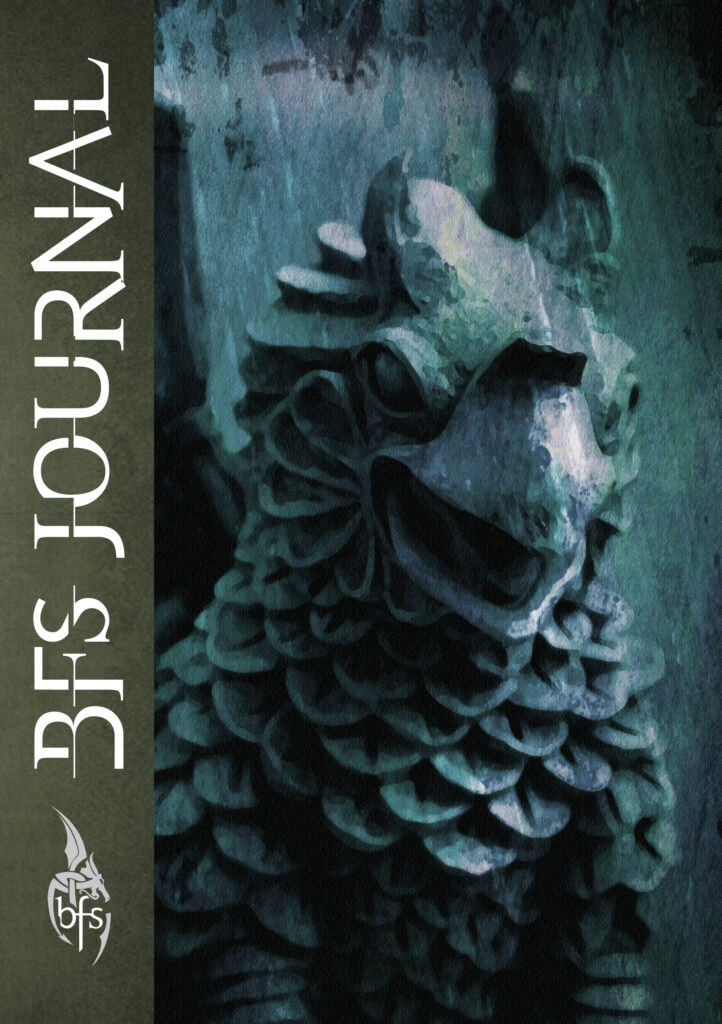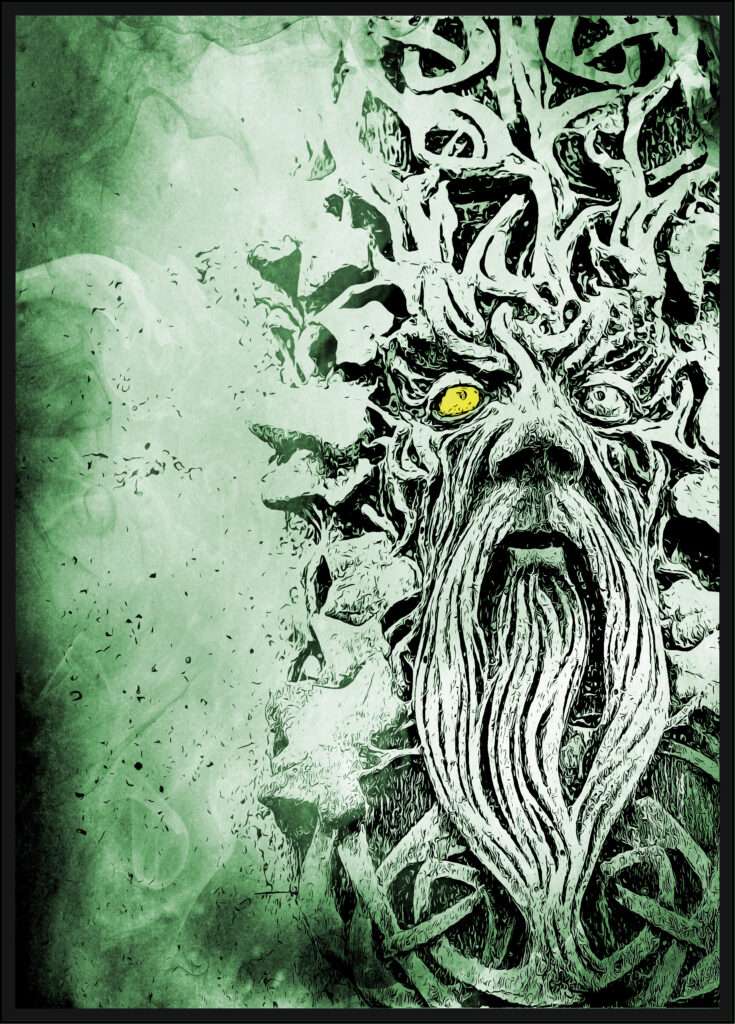Features and non-fiction
Editor: Kevan Manwaring

British Fantasy Society Journal – Call for Submissions for Summer Issue 2026
Call for Submissions: Race in Fantasy
‘Race’—that socially constructed and contentious term and concept—has long been a part of Fantasy. As a way of narrativizing alterity, Fantasy excels (one could argue that it is its sine qua non), but like all other cultural forms it has been prone to the best and worst excesses of this. Although the largesse of Fantasy—its broad, catholic imaginary—embraces a rich spectrum of species, ethnicities, ontologies, and lifeworlds, it has been prone to all the cultural myopias, prejudices, peccadilloes, and stereotyping as any other genre. Exoticism, Orientalism, and Essentialism are only some of its many crimes. And yet many modern writers are helping to rehabilitate Fantasy: decolonising, indigenising, and diversifying its characters, its settings, and its storyworlds; while often embodying those vital energies and agendas themselves (e.g. as writers of colour). This issue seeks to explore this issue – one that is ever-more vital in an age of increasing intolerance, racism, and xenophobia – critiquing and deconstructing, while also defending and celebrating the good work that has been done and continues to be done, not least by the inclusive, supportive Fantasy community.
Possible approaches include:
- Representations of race in Fantasy.
- The decolonisation of Fantasy – exploring non-white, Eurocentric perspectives.
- The diversification of Fantasy – by writers, readers, and publishers.
- Going beyond essentialism and exceptionalism in modern Fantasy.
- So-called ‘Culture Wars’ in Fandom, and strategies for healing apparent rifts.
- Tokenism, and how to avoid it.
- Canonicity, and ways of making it polychromatic and porous.
- Afrofuturism, Africanfuturism, and the Black Fantastic.
- Xenofiction, and more-than-human Fantasy disruptions of the anthropocentric.
Send the Abstract (200 words) with a bio to the Editor by 20th March. The BFS Journal Summer issue will be published 20th June 2026. Completed articles, if commissioned, will be due in by 1st May.
Send to The Editor: bfsjournal@britishfantasysociety.org
About the Journal
BFS Journal is a biannual periodical devoted to scholarly reflections on aspects of Fantasy (including Horror, Weird, and other forms of imaginative literature).
We are looking for well-researched, critical articles on aspects of Fantasy (see call for submissions), reviews (retro, or recent publications including novels, short story collections, graphic novels, films, television, stage plays, TTRPGs, computer games, podcasts, and emergent forms), convention and conference reports, well-written letters discussing Fantasy, celebrations and obituaries of key figures in the Fantasy community, and original artwork.
We do suggest you contact us before writing any substantial article, to check on suitability and word count (for academic articles submit a 200-word abstract and 100-word bionote). Our readers are generally knowledgeable when it comes to fantasy, so don’t be afraid to suggest topics slightly off the beaten track. Hybrid submissions such as ficto-criticism, creative criticism, and “rebellious research” approaches especially welcome.
Academic articles for the BFS Journal should be between 4000 and 8000 words. References in the text should be written using the Harvard notes and bibliography system for the Arts and Humanities (Author, Year of Publication) with a full publication listing for the bibliography given for each article at the end. Please don’t use footnotes in your submissions.
Supply any images as separate files. Use letters in the filenames to indicate the preferred order (e.g. a-arrival.jpg, b-conversation.jpg, c-departure.jpg). Original artwork, photographs, and cartoons are welcome as long as you own the copyright. AI-generated work will not be considered.
Publishers should note that we are always on the lookout for suitable people to interview. We might also be interested in providing our readers with previews of forthcoming non-fiction titles.
BFS Journal is always open to queries, pitches, and submissions, although those responding to specific calls for submission will be given priority. Please familiarise yourself with the Journal before submitting, and bear in mind the specialist audience it is catering for. However, well-written submissions that consider connections between disciplines, genres, audiences, contemporary issues, etc, will always be considered.
Letters to the Editor
We are always interested in publishing correspondence from BFS members, on any aspect of the society, not just the BFS Journal itself.

BFS Journal Submission Guidelines
Scholarly articles are welcome that have been drafted in accordance with the following guidelines:
- Fully-referenced articles using the Harvard notes and bibliography system on the theme of the issue (see Calls for Papers) of 4000-8000 words.
- Reviews of Fantasy in novels, novella, short stories, interaction fiction, TV drama, film, radio, theatrical production, table-top role-playing games, computer games, podcast, graphic novel, etc of 500-1000 words.
- All submissions should be in Times New Roman, 12-point font, double-spaced, standard margins.
- Title and any subtitle should be in bold.
- Beneath the title place your name, also in bold.
- Follow this with the Abstract (200-words).
- Under the Abstract add 5 key-words.
- Add your surname and title in the Header.
- Add page numbers to the Footer.
- After the main text add a 100-word bio-note.
- If it is an Article, add the Notes and Bibliography.
- Add the word count to the end.
- Send as an editable Word docx.
- Title your file SURNAME_TITLE_WINTER_2024 (or whatever relevant issue).
- In the submission email include the title and brief summary of your submission, plus clearly identify yourself as the author, and if appropriate, your BFS membership number, other affiliations, and any previous publications. State whether the submission for consideration is original and unpublished. Work that has been previously published in any form will not be considered.
- Articles and reviews that follow these submission guidelines will be acknowledged on receipt, although please note this is not a guarantee of inclusion, just a courtesy. Those who do not, e.g., generic blanket submissions, will be ignored. If we wish to proceed with your piece, you will receive editorial feedback within one month of the deadline for submissions. You will have 14 days to make any initial changes, then a further 14 days for any final changes. You will be asked to sign-off the proof copy before we go to press (within 5 days). Failure to act upon editorial feedback and meet this production schedule will mean your work will no longer be included, although we may consider it again if an appropriate issue occurs.
- The editor/s reserve the right to make any changes to make the submission suitable for publication, including the removal of inappropriate language and incorrect formatting, although you will be initially requested to do this yourself.
- Usage of any submission will be in accordance with BFS policy.
- Submissions to be sent to The Editor: bfsjournal@britishfantasysociety.org
